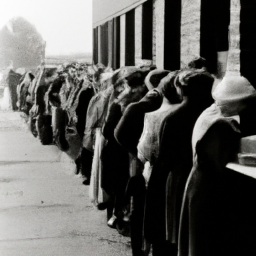During the Great Depression, the world faced an unprecedented economic crisis that left millions of people unemployed and struggling to survive. Today, as we face new challenges, it is essential to learn from the past and understand the lessons that this dark period in history can teach us. In this article, we will take an unvarnished look at the Great Depression and explore the key factors that led to this catastrophic event.
The Great Depression began on October 24, 1929, with the stock market crash in the United States. This marked the beginning of a global economic crisis that lasted for over a decade. The Leavenworth Public Library provides valuable resources on this topic, allowing us to explore the events that unfolded during this tumultuous time.
One of the most significant factors that contributed to the Great Depression was the collapse of the banking system. As the money supply fell by some 30%, loans and mortgages went unpaid, leading to widespread bank runs and panics across the country. This was further exacerbated by the failure of the Bank of United States in December 1930, a modest bank with a grandiose name, as noted by historian Anna Schwartz.
On March 4, 1933, Franklin D. Roosevelt was sworn in as president in the midst of the nation's Great Depression. His administration introduced a series of reforms and programs, collectively known as the New Deal, aimed at reviving the economy and providing relief to the millions of Americans affected by the crisis.
The Great Recession of 2008 shares some similarities with the Great Depression, such as the freezing of the interbank market and the overextension of retail banks. However, there are stark differences in how the two crises were handled, with FDR's New Deal approach contrasting sharply with the bailout of banks during the Great Recession.
Some argue that the lessons of the Great Depression are being ignored today. For instance, FDR would have likely been opposed to the fix for the banking crisis that occurred during the Great Recession, as it did not address the fundamental issues that led to the crisis in the first place.
Moreover, the importance of containing regional bank collapses cannot be overstated. As one commentator noted, "If the Fed does not contain the regional bank collapse, there will be another great depression." This highlights the need for effective oversight and regulation of the financial sector to prevent future crises.
One of the key lessons from the Great Depression is the need for a coordinated and comprehensive response to economic crises. FDR's New Deal included a range of programs and policies designed to address the various aspects of the crisis, from providing relief to the unemployed to reforming the financial sector. This multifaceted approach was crucial in helping the nation recover from the devastation of the Great Depression.
Another lesson from the Great Depression is the importance of addressing income inequality and ensuring that wealth is distributed more equitably. The 1920s saw a significant concentration of wealth among the richest Americans, which contributed to the economic imbalances that led to the Great Depression. Ensuring a more equitable distribution of wealth can help to create a more stable and resilient economy.
In addition to these lessons, the Great Depression also serves as a powerful reminder of the human cost of economic crises. Millions of people lost their jobs, homes, and savings, and the effects of the depression were felt for generations. As we face new economic challenges, it is essential to keep these human costs in mind and prioritize the well-being of people over the interests of big corporations and financial institutions.
In conclusion, the Great Depression provides valuable insights into the causes and consequences of economic crises, as well as guidance on how to address them effectively. By learning from the past and applying these lessons to the present, we can work towards a more stable and prosperous future for all.
